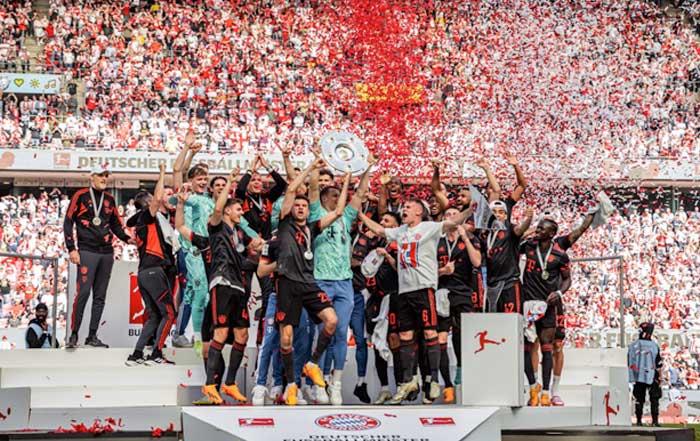In the dynamic world of European football, the landscape of sponsorship is undergoing a significant transformation, characterized by unprecedented growth and diversification. Recent reports indicate that the sponsorship market for European football has experienced a remarkable surge, with an overall increase of 22% in sponsorship and marketing partnerships during the last season. This figure represents a substantial doubling from the previous season's growth rate of 11%, highlighting a burgeoning interest from brands eager to align themselves with the sport's immense popularity and global reach.
The Surge in Sponsorship Deals
According to SponsorUnited's latest report on European Football Marketing Partnerships for the 2023–24 season, over 6,000 sponsorship deals have been registered, showcasing a thriving market that is increasingly sophisticated. The report notes that diverse sectors such as construction, technology, and automotive are at the forefront of this growth, with a staggering 88% of brands opting for exclusive single-club partnerships rather than multi-club agreements. This trend underscores a strategic shift among brands aiming to forge deeper connections with specific clubs and their fanbases.
The increasing number of sponsorship deals can be attributed to several factors. First and foremost, the global appeal of football continues to expand, drawing in fans from various demographics and regions. This broadening audience is attractive to brands seeking visibility and engagement. Furthermore, the departure of high-profile players like Lionel Messi and Cristiano Ronaldo has altered the endorsement landscape, paving the way for emerging stars such as Vinicius Junior and Guillermo Ochoa to take center stage. As these athletes gain popularity on social media platforms, clubs like Real Madrid CF and FC Bayern Munich have witnessed significant follower growth, which in turn amplifies their marketability.
Key Players in Sponsorship Growth
The competitive landscape for football sponsorships is dominated by several prominent companies that have recognized the value of associating their brands with football clubs. Companies like Coca-Cola and EA Sports lead the pack in terms of deal volume; Coca-Cola has secured 39 sponsorship agreements while EA Sports follows closely with 33. Other notable sponsors include eToro and Adidas, each contributing to the robust financial ecosystem surrounding European football.
The financial implications of these sponsorship deals are profound. The global football sponsorship market was valued at approximately $39.36 billion in 2023 and is projected to reach $57.99 billion by 2032, reflecting a compound annual growth rate (CAGR) of 4.4%. This growth trajectory suggests that as football continues to evolve into a more commercially viable sport, brands are increasingly willing to invest substantial resources into building long-term partnerships with clubs.
The Impact of Major Events
Major tournaments also play a crucial role in shaping sponsorship dynamics within European football. The UEFA European Championships held in 2024 generated record sponsorship revenues amounting to $535.25 million, driven by partnerships with brands such as Adidas and Coca-Cola. These events not only attract significant media attention but also provide sponsors with unique opportunities to engage with audiences on a grand scale.
The success of these tournaments is further evidenced by impressive viewership figures; for instance, the Euro 2024 final attracted a peak audience of 24.2 million viewers across major UK networks. Such exposure is invaluable for sponsors looking to enhance brand recognition and loyalty among consumers.
Regional Trends and Club-Specific Deals
While the Premier League remains a dominant force in global football sponsorship revenue generation, clubs from Italy's Serie A and Spain's LaLiga have emerged as key players in securing lucrative partnerships. Notably, Real Madrid leads the way with its shirt sponsorship deal worth €70 million per year with Fly Emirates, a figure matched by Barcelona's partnership with Spotify and Manchester United's recent agreement with Qualcomm's Snapdragon.
Interestingly, Serie A clubs have surpassed Premier League teams in terms of new sponsorship agreements this season, signaling a shift in regional dynamics within European football. As clubs seek innovative ways to enhance their brand appeal, they are increasingly turning to local businesses for support while also exploring international markets.
Challenges and Opportunities Ahead
Despite the optimistic outlook for sponsorship growth in European football, challenges remain on the horizon. The pandemic had previously disrupted many aspects of sports however, as stadiums reopen fully and fan engagement has returned to pre-pandemic levels, clubs are poised to capitalize on renewed interest from sponsors.
Moreover, as brands navigate an ever-evolving digital landscape characterized by social media engagement and influencer marketing strategies, they must adapt their approaches to maximize their return on investment in sponsorship deals. The rise of non-traditional sectors engaging with football—such as business services—reflects this maturation process within the industry.
In conclusion, European football is experiencing an exhilarating phase marked by substantial increases in sponsorship deals driven by diverse brands eager to capitalize on the sport's global appeal. As clubs continue to forge strategic partnerships that resonate with fans while adapting to changing market dynamics, the future looks bright for both sponsors and teams alike. The interplay between brand investments and club revenues will undoubtedly shape the trajectory of European football for years to come.

